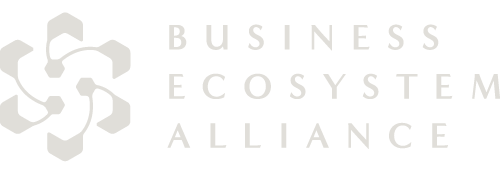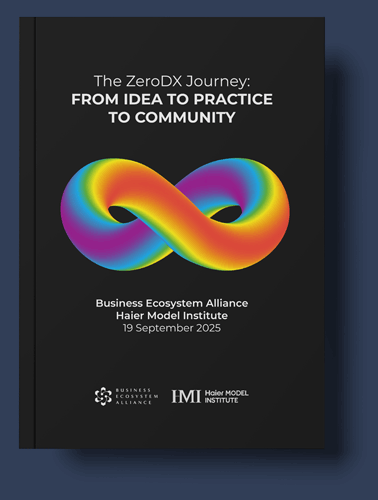

Eppo: From Hierarchy to Human-Centred Self-Management in Brazil
Eppo was a winner in the Emergent Excellence category of the 2025 ZeroDX Awards announced in Beijing on 19 September 2025.
Eppo’s story began in 1995, when economist João Ventre founded the company with a practical mission: to improve urban environments in Brazil through waste collection and construction.
Over the next three decades, the company evolved steadily, expanding into waste treatment, sustainable infrastructure, and public services. But its most profound transformation began in 2013, when João’s son, Rodrigo Ventre, joined the company.
Rodrigo did not originally intend to work in the family firm. By then, he had already built a consultancy focused on integrating prosperity and purpose, rooted in spiritual and social principles drawn from Anthroposophy and his own life experiences. When Eppo invited him to support its restructuring, he approached the task with two lenses: a clear understanding of traditional business challenges and a deep belief in the human side of work.
At the time, the business was split between waste management and construction. The latter, heavily reliant on public contracts, brought low margins and frequent delays in payment. Over the next five years, Eppo gradually exited the construction business to focus entirely on waste services. The shift, though strategically necessary, came with painful consequences. Around 400 employees left the organisation during this period. As Rodrigo recalled, the transition wasn’t always soft, but it was gradual and it created space for a more focused and resilient organisation.
This period laid the foundation for employees to reconnect with purpose. Eppo’s mission became clearer, and teams began to participate more actively in shaping the future of the company. This was a step toward what RenDanHeYi refers to as zero distance to mission and strategy, in which employees align deeply with organisational goals and take initiative in making them real.
Once the structural base had shifted, Rodrigo turned his focus to culture. Drawing on his earlier work in personal development, he launched a program called “Leader of Yourself.” It invited employees, many of whom had never participated in formal education, to share their life stories in group settings. With the help of "angels," colleagues who translated or supported those who could not read or write, participants developed empathy, self-awareness, and pride in their own journeys. In a striking reversal of conventional roles, operational workers often facilitated sessions for new managers. The result was a profound cultural shift in how employees related to one another and to their work.
Other practices emerged as well. Eppo launched a theatre program to explore emotional expression and group dynamics, and created a social support structure for workers facing hardship. The goal was to build not just professional competence but human connection. These initiatives fostered what employees began to call “the Eppo family.” But even strong bonds can produce inertia. With dozens of committees and frequent efforts at consensus, decision-making became slow. While the company felt inclusive, power still concentrated at the top.
Rodrigo saw that too much collectivism had become a barrier to true autonomy. Committees gave people a voice, but not always the authority to act. He began planning a deeper transformation, one that would distribute power structurally, not just culturally.
In 2020, Eppo partnered with Target Teal to implement O2, short for Organizações Orgânicas, a Brazilian governance model developed to support decentralised decision-making in complex organisations. O2 draws on the principles of both Sociocracy and Holacracy but adapts them for the Brazilian context, placing a strong emphasis on clear roles, local authority, and structured collaboration. Within this model, circles replaced departments, and responsibilities were distributed across clearly defined roles rather than concentrated in traditional management hierarchies.
The CEO role was dissolved. Budget control shifted to a peer-governed circle called Future Eppo. Responsibility for hiring, firing, and promotions moved to a dedicated group called Collabora Eppo, where decisions are based on structured peer evaluations and transparent criteria. Rodrigo stepped back from formal leadership. His previous responsibilities now live in multiple roles held by others, including a former street-level employee who rose through the ranks.
To sustain and deepen its self-management practices, Eppo recently introduced a new version of its Meta Agreements. These agreements define the shared protocols that support autonomy, clarify roles, and structure how decisions are made across the organisation. Drawing from frameworks like Sociocracy, Holacracy, and O2, they act as a common language for collaboration and distributed authority. Far from being static rules, the Meta Agreements are treated as a living system, adaptable, participatory, and openly discussed. As the Eppo team describes them, they “bring direction without command and alignment without hierarchy.”
The agreements were launched internally through facilitated sessions, complete with a printed booklet to mark the moment. It was more than a policy rollout. For many, it symbolised the next stage in Eppo’s transformation, a visible expression of how self-management is becoming embedded not just in tools and roles, but in the culture itself.
The transition was not without resistance. A minority of managers actively undermined the change. Looking back, Rodrigo said he would have addressed that resistance earlier, before fear could take root. But over time, the new system took hold. Today, most employees express pride in the self-managed structure and say they would not return to the old way of working.
Eppo’s internal surveys show high satisfaction, and the company continues to be recognised as one of Brazil’s best employers.
Many of these developments echo the principles of Zero Distance. Decision-making is increasingly local and decentralised, demonstrating zero distance to action. Power has shifted away from a central figure and into defined roles, reflecting zero distance to leaders. Evaluation and rewards are now based on concrete contributions, not proximity to authority, aligning with Zero Distance to results and rewards. Employees in operational roles are supported to voice concerns without fear, and the company works with an independent ethics platform to ensure safety and transparency, contributing to zero distance to colleagues and partners.
Eppo’s journey was shaped by its own context. What began as a family business grew into a living network of interconnected circles, where people take responsibility not because they are told to, but because they see the impact of their work every day. Decision-making is no longer confined to titles, and initiative is recognised wherever it appears. As Rodrigo put it, “When self-management reaches people’s hearts, not just their minds, the work becomes theirs.” That shift has not only reshaped how Eppo operates, it has redefined what it means to belong to a company, where people grow by leading and stay because it feels like their own.
Originally created by Corporate Rebels


